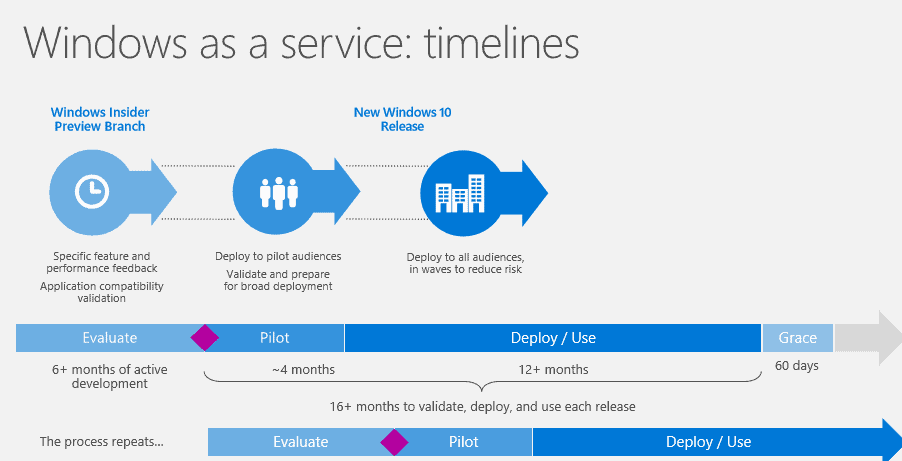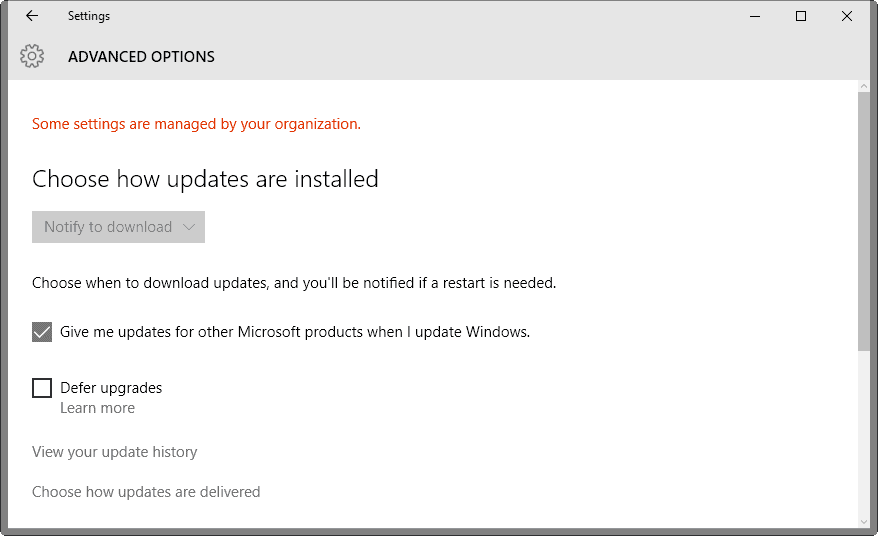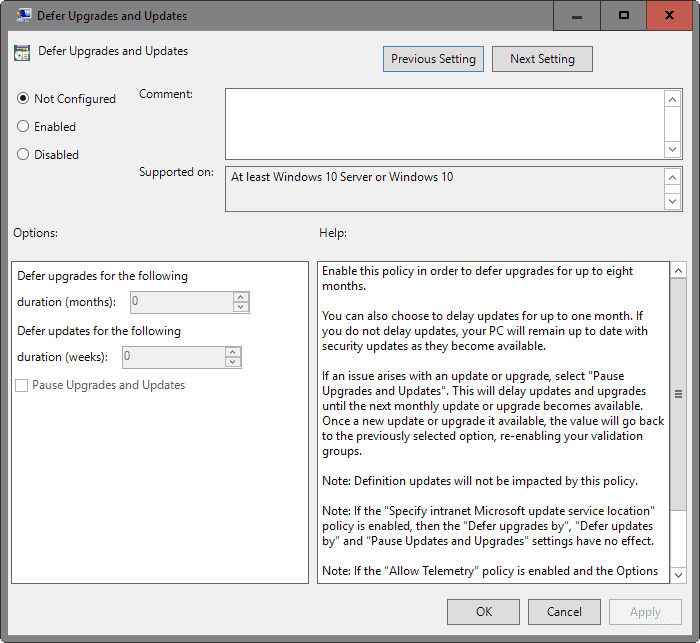Microsoft sheds light on Windows 10 update policy

Microsoft senior program manager Chris Riggs revealed information about the company's Windows 10 update and upgrade in a presentation at the WinHEC technical conference in Taiwan.
While Riggs addressed business and Enterprise customers in the Windows As A Service presentation, some of it is also interesting to Home users.
Microsoft plans to release single cumulative updates each month, and so-called feature updates twice a year.
These cumulative updates are already used by the company. They supersede the previous month's update, and contain only security, reliability or bug fixes according to Microsoft.
Feature updates on the other hand, with the next major one called the Anniversary Update out in July 2016, ship with new features and capabilities but are released less frequently.
Windows 10 update timelines

Microsoft attempts to use the same timeline for each Windows 10 feature build that follows the scheme evaluate, pilot and deploy/use.
After six or more months of active development and testing using the Insider program, the new feature release is published to Current Branch systems.
The update is distributed to most consumer editions of Windows at this point in time. Windows 10 Home users have no option but to accept the update, while Pro, Education and Enterprise customers can configure the operating system to defer upgrades.
Doing so ignores feature updates during the pilot phase which will last for about four months.
The update is then pushed to all audiences after the four month pilot phase.
Microsoft notes that each Windows 10 release has its own lifecycle, and that they all start as Current Branch releases and proceed to Current Branch for Business afterwards.
There is also a Long Term Servicing Branch (LTSB) but it is limited to Enterprise customers. The core difference is that Long Term Servicing Branch systems don't require feature upgrade installations to stay supported.
How to defer upgrades

Windows 10 Pro, Education and Enterprise systems can be configured to defer upgrades. Note that Microsoft makes a clear distinction between updates and upgrades, with the former referring to monthly updates and the latter to the bi-annual feature releases,
- Tap on the Windows-key and select the Settings icon from the menu. Or, use Windows-I to open the Settings application right away.
- Select Update & Security on the start screen.
- Make sure Windows Update is selected on the next screen.
- Select Advanced options on the page.
- There you find listed the Defer upgrades option. Check it to skip feature upgrades during the pilot phase.
You may also configure the defer upgrades option using the Group Policy Editor instead. It offers better customization options.

- Tap on the Windows-key, type gpedit.msc and hit enter. This should open the Group Policy Editor. Note that the editor is not available on Home systems.
- Follow this path using the tree hierarchy on the left: Local Computer Policy > Computer Configuration > Administrative Templates > Windows Update.
- Double-click on the Defer Upgrades and Updates policy.
- Switch the policy to Enabled at the top.
- Now you can defer upgrades (the bi-annual feature upgrades) by months, and updates (monthly fixes and patches) for weeks.
- Feature upgrades can be postponed for up to eight months, and regular updates for up to four weeks.
The same policy holds an option to pause upgrades and updates. This blocks updates and upgrades "until the next monthly update or upgrade becomes available". The value resets automatically when that happens.
Also, Windows Defender definition updates are not blocked if the policy is enabled. Defer upgrades and updates has no effect if the "allow Telemetry" policy is enabled and set to the value of 0.


















The ability to set the deferment is not there with the Pro version. It only has the default deferment periods.
This if once MS stops support for your os, it suddenly becomes a security risk or more insecure is bs , I am still running xp on a very old box , and as long as 3rd party software vendors support it I’ll keep on using it,
Why are MS so really desperate to upgrade everyone to 10? something that they aren’t charging a fee for just yet, Something doesn’t add up
As for all these 3rd party utilities that claim to stop win 10 spying sending your personal data to ms and possibly 3rd parties , granted they may stop some of it, but it’s quite likely that they don’t completely stop it, Then there is the issues with lack of end user control with updates, and the gui that was designed for a phone and not a desktop PC
MS have imo lost the plot with 10 ,A PC is a personal computer, meaning the end user is boss not the os vendor
windows 7 until end of lie then switching to linux!! : )
The Windows 10 upgrade is currently FREE until July 2016. If I was someone still using Windows 7 or Windows 8, I would upgrade sooner rather then later or you will have to cough up an extra $200+ or £170+. Its a no brainer upgrade now before they start charging.
OH noes, lmao. We might have to PAY for an upgrade we don’t want?! Dduuuuude. Well, fortunately I think we’ve got about 5 yrs to sit pretty on stable 7 or 8.1 and see what Microsoft’s next hairbrained move will be.
Unless you don’t plan on upgrading. Windows 7 is supported til 2020, Windows 8 til 2023. That’s a long time.
A clarification of this new Microsoft strategy:
“24 May 2016
Microsoft has kicked its ‘Get Windows 10’ deception up another notch. As reported in articles such as this one, the already deceitful GWX nagware, which famously prompts Windows 7 and 8.1 users with only two options, both of which result in upgrading to Windows 10, has been modified again. Previously, you could click the small X in the top right corner of the prompt to exit without upgrading; now, clicking the X also starts the upgrade process. So basically, less tech-savvy users, who are not aware of third party tools like GWX Control Panel or Never10, will now wind up being upgraded to Windows 10 no matter what they click. Microsoft has single-handedly changed operating system upgrade etiquette from “Do you wish to upgrade your OS?” to “Just try and stop us from upgrading your OS”. And bear in mind that Windows 10 isn’t some critical security update for, or arguably even functionally better than, Windows 7 or 8.1 – this shameful deception is entirely for Microsoft’s commercial benefit.
I’ve already made my rather negative views about Windows 10 and Microsoft known, most recently in this mini-rant a couple of months ago. But there are other voices with equally harsh views regarding Microsoft’s ignominious slide into untrustworthiness. The latest is Susan Bradley, Microsoft MVP, who says this regarding the forced Windows 10 upgrades: “…I think Microsoft is being a bully on the Internet. A big bully. The manner in which Windows 10 has been pushed out the patching channel has me seriously questioning if I want to be associated with this Company going forward.”
Update: Even Paul Thurrott, who has long defended all things Microsoft, says: “This is indefensible…the violation of trust here is almost indescribable.”
http://www.tweakguides.com/
honestly I do not even read MS info anymore. Stuck on 7 and 8.1
bye bye redmond
@martin – can you found some stuff about LTSB if will upgrade to something when AU comes? ( anniversary update)
on that moment, LTSB will reach the 1 year delay :D
Based upon the GWX campaign constantly changing the rules, why should we believe anything that Microsoft says?
Windows home also can defer upgrades but cannot prevent the upgrades. While you can prevent upgrades and turn off updates check in Pro version.
edit:
I saw the screenshot in the article you linked. This is the current screenshot of the Home version
http://i.imgur.com/1lcg9OR.jpg
Not saying you wrong but something strange seems to be going on as everything I’ve read here…
https://technet.microsoft.com/en-us/itpro/windows/manage/introduction-to-windows-10-servicing
Says…”In addition, because Windows 10 Home does not support deferred installation of feature upgrades, servicing updates produced from Servicing Branch #1 are targeted at devices running Windows 10 Home only until Microsoft publishes feature upgrades for deferred installation.”
@Corky
The option has been there since I upgraded from 8 but I never use it, so I don’t know if it really works or not :)
Interesting, thanks for the screenshot.